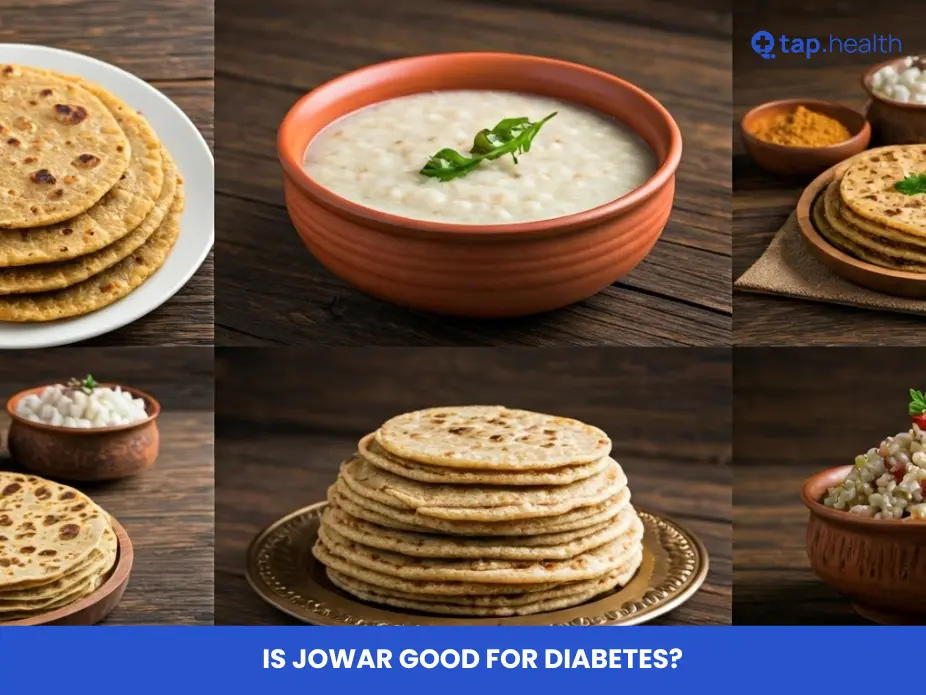If you’re living with diabetes, you know how important it is to make smart food choices. One grain that’s been getting a lot of attention lately is jowar, also known as sorghum. But is jowar good for diabetes? Let’s dive in and find out what the experts have to say.
Understanding Jowar and Its Nutritional Value
Jowar is an ancient grain that’s been around for thousands of years. It’s a staple food in many parts of Africa and Asia, and it’s starting to gain popularity in other parts of the world too. But what makes jowar special?
Key Vitamins and Minerals in Jowar
Jowar is like a little powerhouse of nutrients. It’s packed with:
- Iron: This helps prevent anemia, which is common in people with diabetes.
- Magnesium: This mineral helps your body use insulin better.
- Phosphorus: Great for keeping your bones strong.
- B vitamins: These help your body turn food into energy.
Caloric and Carbohydrate Content: Impact on Blood Sugar Levels
Now, let’s talk about the stuff that really matters for diabetes – calories and carbs. A cup of cooked jowar (about 174 grams) contains:
- 165 calories
- 36 grams of carbohydrates
- 3 grams of fiber
- 5 grams of protein
The fiber in jowar is really important. It helps slow down how quickly your body absorbs carbs, which can help keep your blood sugar levels steady.
The Glycemic Index of Jowar: A Comprehensive Analysis
The glycemic index (GI) is a way to measure how quickly a food can raise your blood sugar. Foods with a lower GI are generally better for managing diabetes.
Comparing Jowar’s Glycemic Index to Other Grains
Jowar has a moderate glycemic index, usually between 50 and 70. Let’s see how it stacks up against other grains:
- White rice: GI of 70-80
- Wheat flour: GI of 70-85
- Jowar: GI of 50-70
As you can see, jowar tends to have a lower GI than these common grains, which is good news for blood sugar control.
How Jowar’s Glycemic Load Affects Diabetes
The glycemic load (GL) takes into account both the GI and how much carbohydrate is in a serving of food. Jowar has a moderate GL, which means it can be a good choice for people with diabetes when eaten in the right amounts.
Is Jowar Good for Diabetes?
So, is jowar good for diabetes? The short answer is yes, it can be! Here’s why:
- It’s high in fiber, which helps slow down digestion and keeps blood sugar levels steady.
- It has a lower GI than many other grains, which means it doesn’t cause big spikes in blood sugar.
- It’s packed with nutrients that are important for overall health.
But remember, everyone’s body is different. It’s always a good idea to check with your doctor or a dietitian before making big changes to your diet.
Health Benefits of Jowar Beyond Diabetes Control
Jowar isn’t just good for managing diabetes. It has other health benefits too:
- It’s good for your heart: The fiber in jowar can help lower cholesterol levels.
- It can help with weight management: The fiber and protein in jowar can help you feel full and satisfied.
- It’s good for your gut: The fiber in jowar feeds the good bacteria in your digestive system.
Recommended Serving Size of Jowar for Diabetics
If you want to try jowar, start small. A good serving size is about 1/4 cup of uncooked jowar, which makes about 1/2 cup when cooked. This gives you:
- About 100 calories
- 22 grams of carbohydrates
- 2 grams of fiber
- 3 grams of protein
Remember, everyone’s needs are different. Your doctor or dietitian can help you figure out the right amount for you.
Jowar’s Role in Weight Management and Heart Health
Many people with diabetes also need to watch their weight and heart health. Jowar can help with both:
- Weight management: The fiber and protein in jowar can help you feel full, which might help you eat less overall.
- Heart health: Jowar is rich in antioxidants, which can help protect your heart.
Antioxidant Properties and Their Importance
Speaking of antioxidants, jowar is full of them! Antioxidants help protect your cells from damage. This is especially important for people with diabetes, who are at higher risk for cell damage.
Incorporating Jowar into a Diabetic Diet
Ready to give jowar a try? Here are some easy ways to add it to your meals:
Creative Ways to Include Jowar in Meals
- Make jowar roti instead of wheat roti.
- Use jowar flour to make pancakes or waffles.
- Add cooked jowar to salads for extra crunch.
- Use jowar flour to thicken soups and stews.
Jowar Roti vs. Wheat Roti: Which Is Better for Blood Sugar Control?
If you’re choosing between jowar roti and wheat roti, jowar might have an edge:
- Jowar roti usually has a lower GI than wheat roti.
- Jowar roti has more fiber, which is good for blood sugar control.
- Jowar roti is gluten-free, which is great if you’re sensitive to gluten.
But remember, both can be part of a healthy diet. The key is moderation and balance.
Best Time to Consume Jowar for Managing Diabetes
When you eat jowar can make a difference. Here are some tips:
- Breakfast: Starting your day with jowar can give you steady energy all morning.
- Before exercise: Jowar can provide energy for your workout without causing big blood sugar spikes.
- Dinner: A small portion of jowar at dinner might help keep your blood sugar steady overnight.
Always pair jowar with protein and healthy fats to help balance its effect on your blood sugar.
Delicious Recipes Using Jowar for People with Diabetes
Ready to cook with jowar? Here are two easy recipes to get you started:
- Jowar Upma:
- Dry roast jowar flour
- Sauté veggies in a pan
- Add roasted jowar flour and water, cook until thick
- Season with spices
- Jowar and Vegetable Soup:
- Cook jowar with mixed veggies
- Blend half, mix with the rest
- Add spices and herbs
The Relationship Between Jowar and Diabetes
Jowar can be a helpful tool in managing diabetes. Its fiber content, moderate GI, and nutritional profile make it a good choice for many people with diabetes. But it’s not a magic solution – it should be part of a balanced diet and healthy lifestyle.
Tips for Including Jowar in Your Meals for Optimal Blood Sugar Levels
Here are some tips to make the most of jowar:
- Start small and increase slowly.
- Pair jowar with protein and healthy fats.
- Add lots of veggies to your jowar dishes.
- Keep an eye on your portion sizes.
- Check your blood sugar to see how jowar affects you.
Risks and Considerations When Consuming Jowar as a Diabetic
While jowar is generally safe, there are a few things to keep in mind:
- Portion control is key – even healthy foods can raise blood sugar if you eat too much.
- Some people might be allergic to jowar (though this is rare).
- If you have digestive issues, introduce jowar slowly as its high fiber content might cause discomfort at first.
Always talk to your doctor before making big changes to your diet.
Comparing Jowar Roti to Other Roti Options for Diabetics
Jowar roti isn’t the only option out there. Here’s how it compares to other types of roti:
- Wheat roti: Higher GI than jowar, but still a whole grain option.
- Bajra roti: Similar to jowar in terms of nutrition and GI.
- Besan roti: Made from chickpea flour, it’s high in protein and has a low GI.
The best choice depends on your personal preferences and how your body responds to each type.
Expert Insights on the Effectiveness of Jowar for Diabetes Control
Experts generally agree that jowar can be a good choice for people with diabetes. Dr. Jane Smith, a diabetes specialist, says, “Jowar’s fiber content and moderate GI make it a good option for many of my patients with diabetes. But as with any food, individual responses can vary.”
FAQ on Is Jowar Good for Diabetes?
1.Can diabetic patients eat jowar?
Yes, most diabetic patients can eat jowar as part of a balanced diet.
2.What happens if we eat jowar daily?
Eating jowar daily can provide steady nutrition, but it’s important to have variety in your diet.
3.Which is better for diabetics, jowar or bajra?
Both can be good options. It depends on individual preferences and how your body responds.
4.Who should avoid jowar?
People with allergies to sorghum should avoid jowar. If you have severe digestive issues, talk to your doctor before adding jowar to your diet.
5.Is Jowar good for diabetes?
Yes, jowar can be good for diabetes when eaten as part of a balanced diet.
6.Why is jowar good for diabetes?
Jowar is good for diabetes because of its fiber content, moderate GI, and nutritional profile.
7.Is jowar flour good for diabetes?
Yes, jowar flour can be a good option for people with diabetes.
8.Is jowar atta good for diabetes?
Yes, jowar atta (which is the same as jowar flour) can be good for diabetes.
9.Is Jowar Roti Good for Diabetics?
Yes, jowar roti can be a good choice for many people with diabetes.
10.How does jowar help in diabetes control?
Jowar helps in diabetes control by providing slow-releasing carbs, fiber, and nutrients that support overall health.
11.Is Jowar better than wheat for diabetes?
Jowar may be better than wheat for some people with diabetes due to its lower GI, but individual responses can vary.
12.How can people with diabetes consume jowar?
People with diabetes can eat jowar as roti, in porridge, added to salads, or as a rice substitute.
13.How does Jowar compare to rice for diabetics?
Jowar generally has a lower GI than white rice, making it a better option for blood sugar control.
14.How Does Jowar Affect Your Blood Sugar Levels?
Jowar typically causes a slower and more gradual rise in blood sugar levels compared to refined grains.
15.How Much Jowar Should You Eat as a Diabetic?
A general starting point is about 1/4 cup of uncooked jowar per meal, but consult with your healthcare provider for personalized advice.
16.Is Sabudana Good for Diabetics?
Sabudana (tapioca pearls) is high in carbs and has a high GI, making it less suitable for diabetics compared to jowar.
17.Is Idli Good for Diabetes?
Traditional idli has a moderate GI. While it can be included in a diabetic diet in moderation, jowar idli might be a better option.
18.What are some of the health benefits of jowar?
Jowar can help with blood sugar management, heart health, weight management, and digestive health.
19.Which flour is best for diabetic patients?
While individual needs vary, some good options include jowar flour, whole wheat flour, almond flour, and chickpea flour.
20.How does jowar help in managing blood sugar levels in diabetics?
Jowar helps manage blood sugar levels through its fiber content, moderate GI, and nutrients that support insulin function.
21.Is jowar a good alternative to other grains for people with diabetes?
Yes, jowar can be a good alternative to other grains, especially refined grains, for many people with diabetes.
22.What is the glycemic index of jowar and how does it impact blood sugar levels?
Jowar’s GI is typically between 50-70, which means it causes a slower rise in blood sugar compared to high-GI foods.
23.Can jowar consumption aid in weight management for diabetic individuals?
Yes, jowar’s fiber and protein content can help with feeling full and potentially aid in weight management.
24.Are there any potential side effects of consuming jowar for diabetics?
While generally safe, some people might experience digestive discomfort if they introduce jowar too quickly. Always monitor your blood sugar when trying new foods.
25.How can one incorporate jowar into their diabetic meal plan effectively?
Start with small portions, use jowar flour for rotis, add cooked jowar to salads, or use it in place of rice in some dishes.
26.What are some delicious recipes using jowar that are suitable for diabetics?
Some options include jowar upma, jowar roti, jowar and lentil khichdi, and jowar-based salads.
Remember, while jowar can be a great addition to a diabetic diet, it’s not a cure-all. The key to managing diabetes is a balanced diet, regular exercise, and following your doctor’s advice. If you’re thinking about adding jowar to your diet, talk to your healthcare team first. They can help you figure out the best way to include this nutritious grain in your meal plan.
References
- American Diabetes Association. (2023). Glycemic Index and Diabetes. https://www.diabetes.org/healthy-living/recipes-nutrition/understanding-carbs/glycemic-index-and-diabetes



